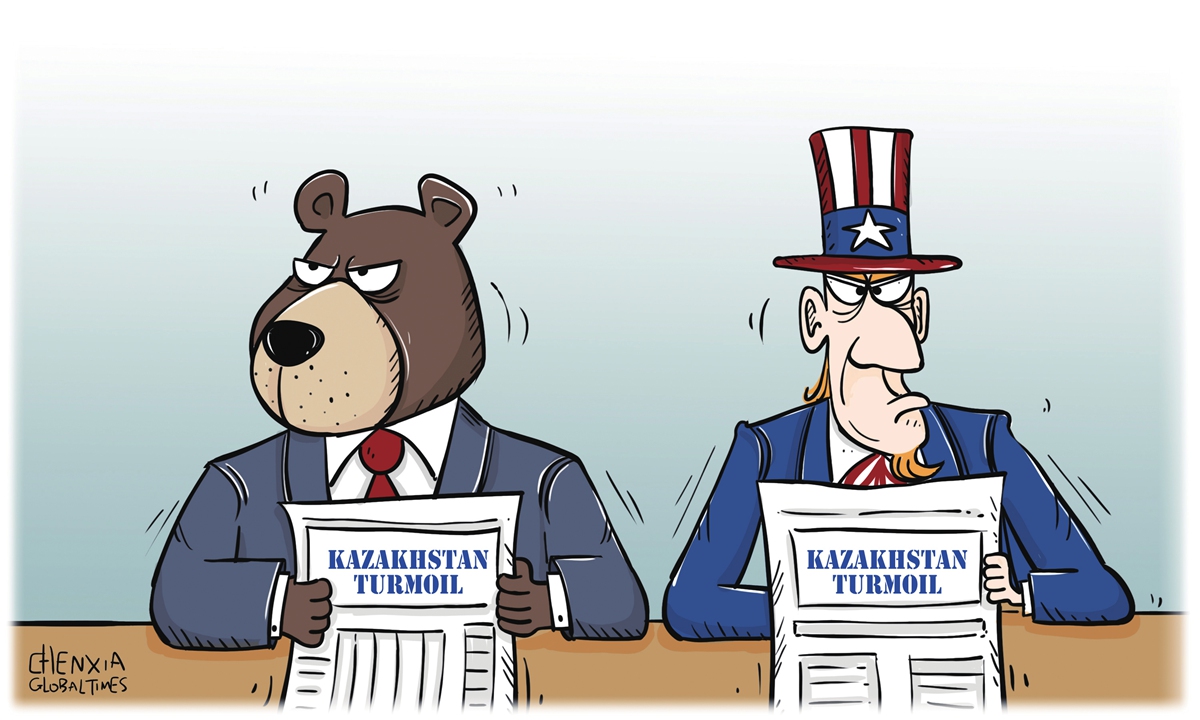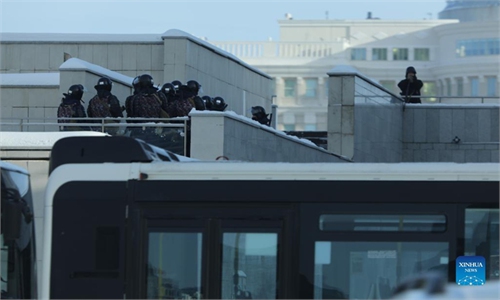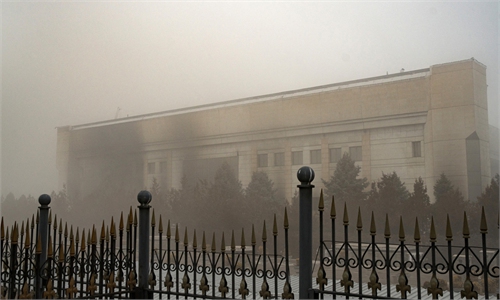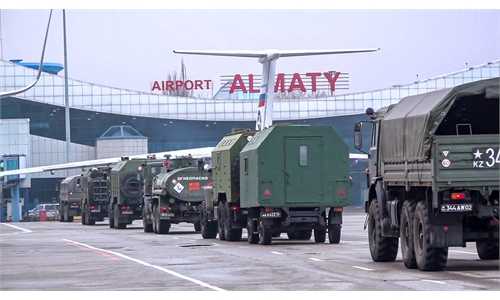
Illustration: Chen Xia/Global Times
The international political calendar in 2022 began with a very strained security situation in Kazakhstan, a country traditionally known to have one of the most stable political regimes of the post-Soviet states. Many of these states already went through the processes of political imbroglios and power redistribution during "color revolutions" which engulfed Armenia, Georgia, Ukraine, Kyrgyzstan, Azerbaijan, Belarus, Moldova and Uzbekistan between 2000 and 2020.
Some aftershocks occurred later and were exemplified by the 2011-13 Russian protests, the Ukraine political crisis of 2013-14, the 2019-20 Uzbekistan protests, the 2020 Kyrgyzstani protests and the 2020-21 Belarusian protests.
This time, unrest in Kazakhstan does not resemble the previous protests that rolled over the country in 2011 and 2016 which were mostly associated with economic inefficiencies and other social issues.
This time though, they also commenced with widespread public outrage following the doubling of gas prices. The unrest quickly turned brutal, causing violence, street crossfire and plunder. More than a dozen law enforcement officers were murdered and more than 100 fatalities are reported among the protesters.
Now, although the root causes behind the riots can be debated, one takeaway remains clear - this unrest is going to have significant ramifications for regional and global politics since the outer players are either involved directly (Russia) or closely monitoring the ongoing developments (China, the US and the EU).
Moscow's participation in the events is driven by Kazakh President Kassym-Jomart Tokayev's official request to the Russia-led Collective Security Treaty Organization (CSTO) to provide a peacekeeping contingent in order to sooth the uprising. The reported number of forces is limited to 2,500 with the core comprised of Russian servicemen. Additionally, the other CSTO members such as Armenia, Belarus, the Kyrgyz Republic, and Tajikistan have also expedited forces to buttress the Russian military. This is the first time that the security mechanism of the CSTO has been enacted with the actual deployment of troops for a peacekeeping mission. Earlier it was used only during joint combat drills and remained idle the rest of the time.
Such a milestone in the group's security profile elevates its significance as a peacekeeping regional mechanism and resonates with resentment in Washington, which does not wish to see Moscow acquiring more leverage over its former Soviet allies. No wonder the US doubted Kazakh motives to call Russia in and warned the country's authorities to stay vigilant and not fall into dependency on Russia.
It all speaks to US angst over Russia's growing regional influence. It also goes in tune with its European allies who also have questioned Russian involvement in the crises. The EU's foreign policy chief Josep Borrell was on a two-day trip to Ukraine in a demonstration of solidarity ahead of the Russia-US security talks scheduled for January 10. On Thursday, he hinted at Russia when saying that external military assistance to Kazakhstan revokes "memories of situations to be avoided." European media was similarly fueling the fire by predicting that Russia is slated to "cement its influence" there and speculated about annexation of North Kazakhstan on Crimea's template.
The escalation between Russia and the West happens amid alleged Russian troops buildup on the border with Ukraine. Following the footsteps of US President Joe Biden who earlier warned Russia of "devastating" consequences, Borrell also promised "massive" consequences should it attack Ukraine. So, the American and European approach to Russia will only grow more hostile, since both will regard Russian intentions on post-Soviet space with more suspicion following its active, and so far efficient, response to the Kazakh political crisis.
The Kazakhstan turmoil has again reassured a close-knit Russia-China partnership since both countries have deprecated infiltrated groups of foreign-backed terrorists and opposed external forces "fomenting color revolution." Beijing has also offered to stabilize the situation with the help of the Shanghai Cooperation Organisation (SCO) and stressed that all member states are willing to help, which speaks to its collaboration with Russia on the issue since Moscow is also part of the security group. On the same day, the SCO's Anti-Terrorist Structure published a separate proposition to assist Kazakh authorities upon an official request, which signifies that SCO members may cooperate on such issues in the future providing each other with relevant assistance in placating public riots.
The author is an expert at the Russian International Affairs Council. opinion@globaltimes.com.cn



